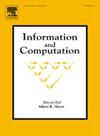用模宽度参数化图问题的多项式图灵压缩
IF 1
4区 计算机科学
Q3 COMPUTER SCIENCE, THEORY & METHODS
引用次数: 0
摘要
参数化问题L的多项式图灵压缩(PTC)是一个多项式时间图灵机,它可以访问问题L '的oracle,使得每次查询的输入参数边界中都有一个多项式。同时,多项式压缩(PC)可以看作是PTC的一种限制变体,机器只能查询一次oracle,并且必须输出与oracle相同的答案。Bodlaender等人(ICALP 2008)以及Fortnow和Santhanam (STOC 2008)在coNP - p - NP/poly假设下提出了令人印象深刻的PC硬度理论。设C为包含ptc但不包含pc的所有问题的集合,假设coNP - p - NP/poly。Fernau等人(STACS 2009)将Leaf Out-tree(k)确定为C语言的第一个问题。然而,人们对C语言知之甚少,在过去的15年里,只有12个问题被确认。悬而未决的问题仍然存在,例如CNF-SAT(n)和k-path是否在C中,需要新的想法来澄清ptc和pc之间的差异。在本文中,我们证明了17个用模宽度(mw)参数化的问题,如色数(mw)和哈密顿循环(mw)属于C,从而丰富了我们关于C的知识。此外,我们开发了一个一般配方来证明一类问题的ptc的存在性,包括这17个问题。本文章由计算机程序翻译,如有差异,请以英文原文为准。
Polynomial Turing compressions for some graph problems parameterized by modular-width
A polynomial Turing compression (PTC) for a parameterized problem L is a polynomial time Turing machine that has access to an oracle for a problem such that a polynomial in the input parameter bounds each query. Meanwhile, a polynomial compression (PC) can be regarded as a restricted variant of PTC where the machine can query the oracle exactly once and must output the same answer as the oracle. Bodlaender et al. (ICALP 2008) and Fortnow and Santhanam (STOC 2008) initiated an impressive hardness theory for PC under the assumption coNP ⊈ NP/poly. Let be the set of all problems with PTCs but without PCs assuming coNP ⊈ NP/poly. Fernau et al. (STACS 2009) identified Leaf Out-tree(k) as the first problem in . However, little is known about , with only a dozen problems confirmed in it over the last fifteen years. Open questions remain, such as whether CNF-SAT(n) and k-path are in , requiring novel ideas to clarify the differences between PTCs and PCs.
In this paper, we enrich our knowledge about by demonstrating that 17 problems parameterized by modular-width (mw), such as Chromatic Number(mw) and Hamiltonian Cycle(mw), belong to . Additionally, we develop a general recipe to prove the existence of PTCs for a class of problems, including these 17.
求助全文
通过发布文献求助,成功后即可免费获取论文全文。
去求助
来源期刊

Information and Computation
工程技术-计算机:理论方法
CiteScore
2.30
自引率
0.00%
发文量
119
审稿时长
140 days
期刊介绍:
Information and Computation welcomes original papers in all areas of theoretical computer science and computational applications of information theory. Survey articles of exceptional quality will also be considered. Particularly welcome are papers contributing new results in active theoretical areas such as
-Biological computation and computational biology-
Computational complexity-
Computer theorem-proving-
Concurrency and distributed process theory-
Cryptographic theory-
Data base theory-
Decision problems in logic-
Design and analysis of algorithms-
Discrete optimization and mathematical programming-
Inductive inference and learning theory-
Logic & constraint programming-
Program verification & model checking-
Probabilistic & Quantum computation-
Semantics of programming languages-
Symbolic computation, lambda calculus, and rewriting systems-
Types and typechecking
 求助内容:
求助内容: 应助结果提醒方式:
应助结果提醒方式:


